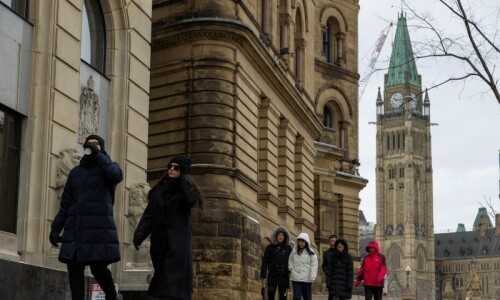
CALI: The world’s biggest nature protection conference opened in Colombia on Monday with calls for urgent action and financing to reverse humankind’s rapacious destruction of biodiversity.
With about a million known species worldwide estimated to be at risk of extinction, Colombian Environment Minister and COP16 president Susana Muhamad warned delegates: “The planet doesn’t have time to lose.” “We all agree that we are underfunded for this mission, we all agree that we need further sources of funding,” the minister told delegates from nearly 200 countries as she opened the Conference of the Parties (COP16) to the UN Convention on Biological Diversity (CBD).
About 23,000 delegates, including some 100 government ministers and several heads of state were accredited for the largest-ever biodiversity COP, running until Nov 1 in the Colombian city of Cali.
‘Words into action’
The delegates have their work cut out for them, with just five years left to achieve the target of placing 30 per cent of land and sea areas under protection by 2030.
COP16 president Susana Muhamad says a million known species worldwide are estimated to be at risk of extinction
A report by Greenpeace on Monday found that only 8.4pc of the global ocean has been designated a Marine Protected Area (MPA). “We are six years from the end of 2030 and yet almost no progress has been made towards protecting 30pc of the world’s ocean. At the current rate, we won’t hit 30pc protection at sea until the next century,” said Greenpeace policy adviser Megan Randles.
CBD executive secretary Astrid Schomaker told delegates on Monday that 34 of the 196 countries signed up to the UN’s biodiversity convention have so far submitted National Biodiversity Strategy and Action Plans to achieve the UN goals. Progress was being made, but “not yet at the rate we need,” she said.
On Sunday, UN chief Antonio Guterres urged countries to “convert words into action” and fatten the Global Biodiversity Framework Fund (GBFF) created last year to meet the UN targets. So far, countries have made about $250 million in commitments to the fund, according to monitoring agencies.
It is part of a broader agreement reached in 2022 under the Kunming-Montreal Global Biodiversity Framework (GBF) to mobilise at least $200 billion per year by 2030 for biodiversity, including $20 billion per year by 2025 from rich nations to help developing ones.
A collapse in natural processes and resources, such as pollination and clean water, could see the global economy lose “trillions of dollars a year,” said Guterres.
Species dwindling
According to the International Union for Conservation of Nature (IUCN), which keeps a red list of at-risk animals and plants, more than a quarter of assessed species are threatened with extinction.
Monitored wildlife populations have decreased by 73pc on average between 1970 and 2020, according to the Living Planet Index, the most comprehensive measure of vertebrate population trends worldwide.
A key goal of the meeting is to agree on a mechanism for sharing the profits and other benefits of genetic information taken from plants and animals, for medicine for example, with the communities they come from — often in lower-income countries.
Every new drug discovered in a tropical forest is worth tens of millions of dollars to a pharmaceutical company, according to scientific estimates.
Host Colombia is one of the most biodiverse countries in the world, and Gustavo Petro, its first leftist president in modern history, has made environmental protection a priority. But the country has struggled to extricate itself from six decades of armed conflict involving leftist guerrillas such as the EMC, right-wing paramilitaries, drug gangs, and the state.
Published in Dawn, October 22nd, 2024

















































